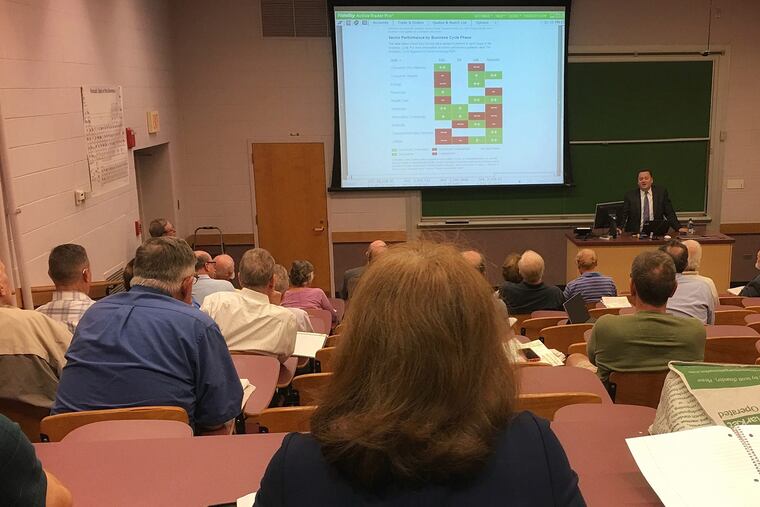Which market sectors are due for an upturn or a downturn? A ‘market technician’ offers clues.
Technical analysis is another tool for investors. It analyzes the movements of the stock price up or down, looking for patterns to make predictions.

While a strange calm has settled over the stock market, some sectors are selling off and others are peaking.
We asked Revere Securities’ Scott Fullman, a specialist in using technical analysis to make investment decisions, for his take on which parts of the market are ripe for an upturn or a downturn.
Unlike analysts who pore through earnings and other fundamentals of companies, chartered market technicians like Fullman analyze the movements of stock prices, looking for patterns. Currently, Fullman said, so-called Big Pharma, which includes major drugmakers, “is attempting to turn up, but that’s not confirmed yet."
He also closely watches FedEx and UPS as broad economic signal stocks, and said that for now they’re holding steady. Airline shares also have turned positive, while paper and timber stocks have “exited a negative trend and are trying to head back to their February 2019 highs.”
On the other hand, a few internet titans look ready for a pullback, he said.
Netflix, eBay, and Amazon “still have negative signals” on a technical basis, which means they could sell off slightly.
Among sectors that may be peaking, he mentions residential and some other specialty REITs, or real estate investment trusts, to which investors have flocked for dividend income.
Utility stocks “haven’t turned negative yet. Investor money is flowing out of utilities, but it’s still too early to tell the trend.”
U.S. automakers GM and Ford “haven’t peaked yet," he added.
Surprises? Retailers, which have been punished in the past year amid widespread bankruptcies and store closures, may be turning up, Fullman said.
“They look the best they have in the past 18 months,” which may augur well for the holiday shopping season. Restaurants, on the other hand, “are still turning downward, as are the financials.”
Investor education
If you’re a retail investor who wants to learn more about the markets and fundamental and technical analysis, here are some resources.
On Tuesday, Nov. 26, the Philadelphia chapter of the American Association of Individual Investors (AAII) will present “Active vs. Passive Investing,” with discussion by David Volpe, deputy chief investment officer at Emerald Advisers.
He’ll examine the trend toward passively managed investing via index funds and exchange-traded funds, which is now approaching 50% of all assets. Volpe will address lower management fees and increased volatility as investors simultaneously buy or sell the same stocks to match the changes in an index, how stock prices become unrelated to the values of their company’s businesses, and which asset classes are better positioned for active or passive management.
AAII Philadelphia’s meeting takes place from 6 to 8:30 p.m. at Bryn Mawr College Park Science Center, Lecture Hall 25. To register, visit the chapter website: www.AAIIPhiladelphiaChapter.org.
In addition, there’s a relatively new group of investors that meets in Delaware on a monthly basis.
Delaware Valley Equity Investors’ meeting at the Hockessin Public Library, 1023 Valley Rd., will be led by former DuPont executive Rajeev Vaidya. Call 302-239-5160 for information.
Vaidya applies fundamental and technical analysis to equities investing, for capital gains and income. Value, momentum, and dividend investing strategies are the focus, as well as using options to enhance returns and generate income.